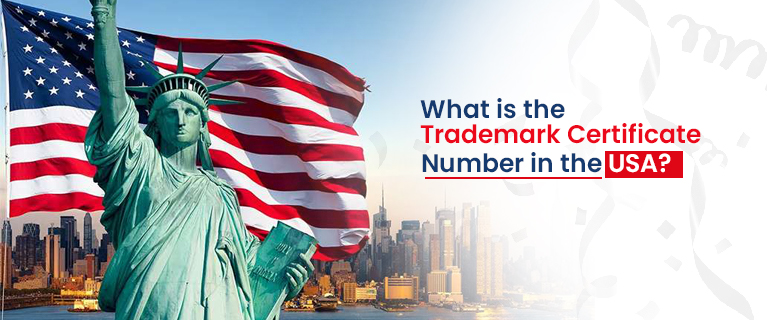In the bustling world of commerce, where brands vie for attention and recognition, trademark registration stands as a beacon of protection. It’s the shield that safeguards a company’s identity, ensuring its uniqueness remains intact amidst a sea of competitors. At the heart of this process lies the trademark certificate number, a crucial identifier in the realm of intellectual property law in the United States.
What is a Trademark Registration?
Before delving into the intricacies of the trademark certificate number, let’s grasp the concept of trademark registration. A trademark is a symbol, word, phrase, or design that distinguishes and identifies the source of goods or services. Registering a trademark with the United States Patent and Trademark Office (USPTO) provides legal protection, granting exclusive rights to use the mark in commerce within the jurisdiction of the United States.
Read also this -: How to Renew the Trademark Registration in the USA
The Importance of Trademark Registration:
Trademark Registration offers a plethora of benefits, including:
1. Legal Protection through Trademark Registration: When a trademark is registered, it creates a public record of ownership, which serves as crucial evidence in case of trademark infringement disputes. This public record not only notifies others of the owner’s exclusive rights to the mark but also provides a clear timeline of when those rights were established. In the event of infringement, having a registered trademark simplifies the process of enforcing legal rights, as it eliminates the need to prove ownership and validity of the mark. Instead, the registration serves as prima facie evidence of ownership, shifting the burden of proof to the infringing party to demonstrate their right to use the mark. This streamlines the legal proceedings and increases the likelihood of a favourable outcome for the trademark owner. Additionally, the public record of registration serves as a deterrent to potential infringers, as they are aware of the legal consequences associated with unauthorized use of the mark. Therefore, USA trademark registration provides businesses with a powerful tool for protecting their intellectual property rights and maintaining the integrity of their brand in the marketplace.
2. Nationwide Protection through Trademark Registration: When a trademark is registered, it grants the owner exclusive rights to use that mark nationwide in connection with the goods or services specified in the registration. This means that others are prohibited from using similar marks in related fields, preventing confusion among consumers and protecting the brand’s reputation. For example, if a company registers a trademark for a particular product name, competitors cannot use a similar name for their products in the same industry, ensuring that consumers can easily identify the source of the goods or services they are purchasing.
3. Enhanced Credibility with Trademark Registration: Consumers often associate registered trademarks with credibility, authenticity, and quality. When a business’s trademark is officially registered, it demonstrates to consumers that the brand is committed to protecting its identity and maintaining the quality of its products or services. This builds trust and confidence among consumers, as they are more likely to purchase from a brand that has taken the necessary steps to protect its intellectual property through trademark registration. For instance, seeing the ® symbol next to a brand name can reassure consumers that the product they are buying is genuine and of high quality, leading to increased sales and brand loyalty.
4. Monetary Value of Trademark Registration: A registered trademark can be a valuable asset for a business, as it can be licensed or sold to generate revenue. Trademark registration provides the owner with exclusive rights to use the mark in connection with specific goods or services, allowing them to profit from licensing agreements with other businesses. Additionally, a registered trademark can increase the overall value of a company, as it represents the goodwill and reputation associated with the brand. In some cases, businesses may even sell their trademarks outright, either as part of a larger acquisition or as a standalone asset. This can be particularly lucrative for well-established brands with strong consumer recognition and loyalty, as the trademark represents a unique identifier that competitors cannot replicate without infringing on intellectual property rights. Overall, trademark registration can significantly enhance the monetary value of a business by providing opportunities for licensing, sales, and increased market share.
Introducing the Trademark Certificate Number:
Following the approval of a trademark application by the United States Patent and Trademark Office (USPTO), the trademark owner receives a trademark registration certificate. This certificate serves as tangible proof of the trademark registration and encompasses essential details, prominently featuring the trademark registration number and the date of certificate issuance.
Upon the successful completion of the trademark registration process, the issuance of the trademark registration certificate marks a pivotal moment for the trademark owner. This document represents official recognition by the USPTO of the exclusive rights granted to the owner over the registered mark. It serves as a concrete manifestation of the legal protection afforded to the trademark and holds significant importance in various aspects of trademark management and enforcement.
The trademark registration number, prominently displayed on the certificate, serves as a unique identifier for the registered mark. This alphanumeric code is vital for verifying the registration status and accessing pertinent information regarding the trademark in official records. It simplifies the process of confirming the validity and scope of the trademark registration, providing clarity and certainty to stakeholders.
Furthermore, the certificate issue date, another critical component of the trademark registration certificate, signifies the formal acknowledgment of the trademark’s registration by the USPTO. This date holds significance in establishing timelines for legal purposes, such as enforcement actions or renewal requirements. It serves as a reference point for documenting the commencement of trademark rights and obligations associated with trademark registration.
In essence, the trademark registration certificate, with its inclusion of the trademark registration number and issue date, stands as a tangible testament to the legal recognition and protection afforded to the registered trademark. It serves as a cornerstone in the framework of trademark management, enforcement, and safeguarding of intellectual property rights, providing assurance to trademark owners and stakeholders alike.
Read also this -: Why do you need USA Trademark Registration
Significance of the Trademark Certificate Number:
The trademark certificate number plays a crucial role for both trademark owners and legal professionals due to several reasons:
1. Verification: The certificate number acts as a key reference for verifying the Trademark registration status and details of a trademark. It enables quick confirmation of the validity and authenticity of the registration, providing assurance to stakeholders.
2. Documentation: During legal proceedings or transactions involving trademarks, documentation of registration is often necessary. The certificate number facilitates easy retrieval of relevant information from official records, thereby expediting the process and ensuring accuracy.
3. Enforcement: In cases of trademark infringement or disputes, citing the certificate number is instrumental in establishing ownership and asserting rights over the mark. It serves as concrete evidence of the trademark’s registration status and the exclusive rights granted to the owner.
4. Renewal and Maintenance: Trademark registrations typically require periodic renewal to remain valid and enforceable. The certificate number simplifies the renewal process by serving as a unique identifier for the registered mark. This ensures that the owner can easily track and manage the maintenance of their trademark portfolio.
Overall, the trademark certificate number serves as a critical tool for ensuring the legitimacy, protection, and effective management of trademark rights, benefiting both trademark owners and legal practitioners involved in trademark-related matters.
Conclusion
In the dynamic landscape of business, safeguarding intellectual property assets is paramount. Trademark registration offers a robust mechanism for protecting brands and their associated goodwill. Central to this process is the trademark certificate number, a tangible proof of registration that empowers owners to defend their rights and preserve the integrity of their brands. As businesses continue to innovate and expand their presence, understanding the significance of the trademark certificate number becomes indispensable in navigating the intricate realm of intellectual property law in the United States.


